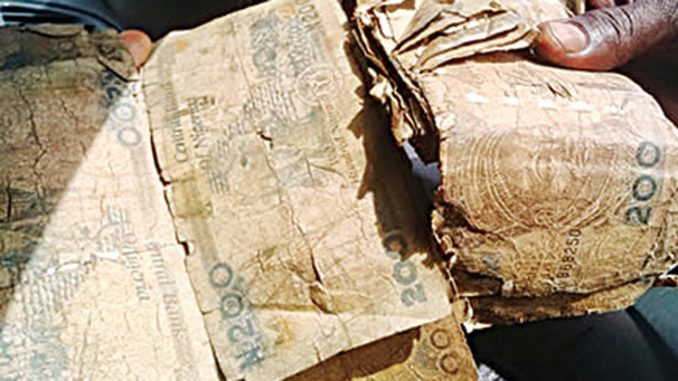
The Central Bank of Nigeria (CBN) and deposit money banks (DMBs) the other day traded blame over who is responsible for large quantities of dirty/unfit Naira currency notes in circulation and the scarcity/shortage in the economy of smaller denominations of Naira currency notes. Nigerians, certainly, have been facing serious challenges accessing smaller denomination Naira currency notes and the dirty/unfit Naira currency notes being dispensed at banks’ counters and Automated Teller Machines (ATMs) for transactions have been a major source of worry.
Though CBN acknowledged its responsibility to issue currency notes but it blamed DMBs for deliberately mixing unfit and new notes available in circulation; not wanting to make investments in the sorting of currency notes; and re-circulation of dirty/unfit currencies instead of sorting out the bad ones and returning them to CBN for replacement.
On the other hand, banks have complained that it takes several weeks, sometimes months, before CBN credits their accounts with cash deposited by them and that CBN imposes on them huge cash handling/sorting costs.
While CBN has rightly agreed it is its statutory responsibility to issue new notes, it must also accept that it is not enough to do so. The importance of ensuring that issued notes are fit to remain in circulation cannot be overemphasised. Consequently, the responsibility of note issuance should extend to ensuring that notes in circulation are fit and clean. This ought to necessitate CBN’s monitoring, on an on-going basis, the quality of currency notes in circulation with a view to recalling and replacing the unclean/unfit ones. This will, to a large extent, ensure that only acceptable currency notes are in circulation.
DMBs equally have roles to play in ensuring that good quality currency notes are in circulation. The roles include currency sorting (separation of dirty/unfit notes from clean ones), returning to CBN unfit for circulation notes for exchange with good ones; making payments to customers/consumers with clean notes both across their counters and through ATMs; not mixing up unfit and fit notes in the same pack; promotion, at least, among their customers, appropriate ways of handling currency notes; and accepting from their customers/consumers unfit notes (except where the currency number(s) have been torn-off, mutilated or obscured).
Unfortunately, banks have grossly fallen short of their expected roles in ensuring clean currency Naira notes are made available to their customers. They even reject from their customers the bad notes although they were the ones that used same notes in making payments.
Banks, by virtue of their transactional relationship with the CBN (CBN is Banker to DMBs) should receive from their customers unfit/dirty notes for replacement by CBN. It is even not within best practice for banks to use unfit for circulation currencies to make cash payments to their customers or their agents. It is also not best practice for banks to reject or refuse or neglect to collect currency notes deposited by their customers on the excuse only, that they are unfit for circulation.
On the issue of scarcity/shortage of smaller/lower denomination of Naira notes, the CBN neither accused the banks of any wrong doing nor provided excuses. Consequently, it is fair to assume it silently accepted full responsibility for not issuing enough of such currencies that should ordinarily oil the wheel of cash-based transactions, especially since the use of coins appears to have become an anathema in the country. If CBN is deliberately starving the economy of currencies of smaller denominations perhaps, on the grounds of its cash-less economy programme, that is very unfair and indeed, unacceptable. This country has not reached the stage where e-based transactions rule the day. Indeed, even in advanced economies that have, for several years, been involved in e-transactions, cash still plays a role in the settlement of financial transactions. CBN should therefore, either put into circulation enough of the lower denomination currencies or find ways to cause acceptance of coins in the country, to facilitate commerce and other financial transactions. Market men and women, artisans, commercial motorists, and others will remain ever grateful to it. To do otherwise will result in inflated prices of goods and services. This economy that has been reported to have recently overcome recession needs everything that will promote exchange of goods and services without buyer or seller losing money as a result of unavailability of lower currency denominations for balances.
In this regard CBN and DMBs should have effective dialogue to find solutions to the challenges in order to make the payment system serve the nation and its citizens better. Operational industry/nation-wide issues such as the foregoing can and should easily be sorted out at the Bankers Committee level where both parties meet bi-monthly. Indeed, instrumentality of the Currency Department of CBN and the Committee of Heads of Operations of Banks in Nigeria should be used to understand the issues, find and implement acceptable enduring solutions.
Finally, both cases of dirty/unfit Naira notes in circulation and scarcity of lower denomination currencies in the economy do not present a wholesome image of the country. Naira is a major instrument of national sovereignty and carries with it the identity of the country. All stakeholders (regulators, operators, consumers, and the general public) should ensure that its quality is incomparably high. Mishandling Naira notes is unacceptable, just as not having it in sufficient clean quantities to meet transaction needs. Poor handling impacts on its quality and increases the costs associated with printing new ones while its scarcity impedes effective settlement of financial transactions.
CBN and DMBs who are main players in the management of the national currency must at all times ensure that users do not have cause, at any time, to lament the state and/or quantum of the national currency in circulation.
END

Be the first to comment